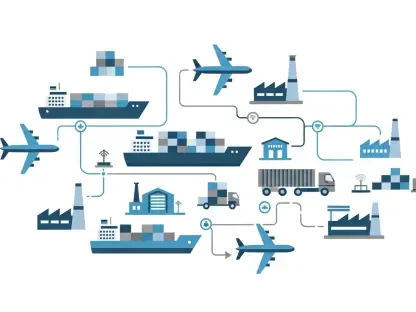In the fast-paced world of airfreight, where every minute counts, the challenge of ensuring timely deliveries while maintaining transparency has long plagued logistics providers. Consider a scenario where a critical shipment of medical supplies is delayed due to a lack of real-time visibility, causing disruptions in a hospital’s supply chain. This is precisely the kind of issue that Delta Cargo aims to address with its groundbreaking Pulse Shipment Tracking Platform, developed in collaboration with technology innovator Trackonomy. Launched to revolutionize cargo management across the United States, this platform promises to enhance efficiency and visibility in an industry hungry for innovation. This review delves into the core features, real-world applications, and transformative potential of Pulse within the airfreight sector.
Core Features and Technological Innovations
SmartTape Technology for Unmatched Precision
At the heart of the Pulse platform lies the SmartTape tag, a cutting-edge tool designed to provide gate-level visibility of shipments. This technology enables precise, real-time location tracking, ensuring that both customers and operational teams receive up-to-the-minute updates on cargo status as it moves from one airport to another. Such granular detail marks a significant departure from traditional tracking methods, which often lack specificity and timeliness.
Beyond mere location data, SmartTape enhances transparency by delivering consistent status reports throughout the shipment journey. This capability allows Delta Cargo to maintain a clear overview of its network, reducing the likelihood of misplaced or delayed cargo. The result is a smoother operational flow, fostering trust among clients who rely on accurate information for their planning needs.
Data Integration and Autonomous Problem-Solving
Another standout feature of Pulse is its ability to integrate diverse data sources into a cohesive system. By combining Delta’s Cargo IQ-compliant data with real-time flight updates and third-party inputs from platforms like FlightAware, the platform creates a comprehensive picture of each shipment’s status. This integration is not just about data collection but about transforming information into actionable insights.
The true power of this feature lies in its predictive analytics and autonomous intervention capabilities. Pulse can anticipate potential disruptions—such as flight delays or logistical bottlenecks—and often resolve them without human input. This proactive approach minimizes downtime and elevates the reliability of Delta Cargo’s services, setting a new standard for operational excellence in airfreight.
Industry Trends and Pulse’s Strategic Alignment
The airfreight sector is undergoing a profound transformation, driven by an increasing demand for transparency and efficiency. Advanced technologies are no longer optional but essential for companies aiming to stay competitive in a digital-first landscape. Pulse aligns seamlessly with this trend, offering real-time tracking and predictive analytics as core components of modern cargo management.
This platform also reflects the broader shift toward digitalization in logistics, where intelligent systems are becoming the norm. By pioneering such technology, Delta Cargo positions itself as a leader in adopting solutions that tackle long-standing issues like delays and opaque processes. Pulse serves as a benchmark for how data-driven innovation can redefine industry practices.
Moreover, the emphasis on autonomous systems within Pulse highlights a growing reliance on artificial intelligence to streamline operations. As logistics providers grapple with complex supply chains, tools like this platform demonstrate the potential to simplify decision-making and enhance service delivery across the board.
Real-World Impact at Major U.S. Hubs
Pulse is currently deployed for Delta’s time-critical DASH and DASH services at numerous key U.S. hubs, including Atlanta (ATL), Los Angeles (LAX), New York–JFK (JFK), and several others such as Boston (BOS), Chicago (ORD), and Seattle (SEA). This targeted rollout focuses on premium services, where speed and reliability are paramount, ensuring that high-priority shipments benefit from enhanced tracking capabilities.
At these locations, the platform has demonstrably improved service quality by reducing delays and providing consistent updates. For instance, operations teams can now pinpoint a shipment’s exact location at any given moment, allowing for quicker responses to potential issues. Customers, in turn, gain confidence from knowing their cargo is under constant, detailed surveillance.
The seamless data flow facilitated by Pulse also enhances communication between airport ramps and cloud-based systems. This connectivity ensures that all stakeholders remain informed, creating a more cohesive and responsive logistics network. Such improvements underscore the platform’s value in high-stakes environments where precision is non-negotiable.
Challenges in Scaling and Adoption
Despite its impressive capabilities, Pulse faces certain challenges in expanding beyond premium services or into international markets. Technical hurdles, such as ensuring compatibility with diverse airport infrastructures, could slow down broader implementation. Additionally, logistical constraints at smaller or less-equipped facilities may pose integration difficulties.
Regulatory and market barriers also present potential obstacles. Data privacy concerns, especially when operating across borders, could complicate the platform’s global rollout. Airport-specific restrictions or varying compliance standards might further limit its adaptability, requiring tailored solutions for different regions.
Delta Cargo is actively working to address these limitations, refining the platform to ensure scalability and compliance with diverse requirements. Efforts to streamline deployment and enhance interoperability suggest a commitment to overcoming these barriers, paving the way for wider adoption in the coming years.
Future Potential in Airfreight Logistics
Looking ahead, Pulse holds significant promise for expansion into additional services and geographic areas. Plans to extend coverage to more airports or even international networks could further amplify its impact, bringing enhanced visibility to a global audience. Such growth would solidify Delta Cargo’s position as an innovator in the field.
Advancements in artificial intelligence and predictive modeling could also elevate the platform’s capabilities. Deeper integration of AI might enable even more precise forecasting of disruptions, while enhanced data analytics could offer richer insights for strategic planning. These developments would likely make Pulse an indispensable tool for logistics providers.
The long-term implications of this technology extend beyond a single company, potentially shaping industry-wide standards for transparency and efficiency. As other players in the airfreight sector take note, Pulse could inspire a wave of similar innovations, driving collective progress toward a more connected and responsive logistics ecosystem.
Final Verdict on Pulse’s Impact
Reflecting on the journey of the Pulse Shipment Tracking Platform, it is clear that its introduction marked a turning point for Delta Cargo’s operations. Its real-time visibility, powered by SmartTape technology, and autonomous problem-solving capabilities redefined efficiency at major U.S. hubs. The platform’s alignment with industry trends toward digitalization is a testament to its forward-thinking design.
For the path forward, stakeholders should focus on supporting Delta Cargo’s efforts to scale Pulse across diverse markets, addressing technical and regulatory challenges through collaborative innovation. Exploring partnerships with international airports and investing in AI enhancements could unlock even greater potential. Ultimately, Pulse lays a strong foundation for intelligent tracking, and the next steps involve building on this success to transform global airfreight logistics.









